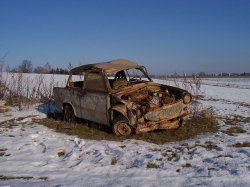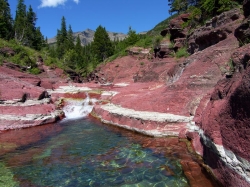You may have heard the saying "solid as a rock." People use it to talk about something that cannot be broken. However, nothing lasts forever, not even a rock. Giant rocks break down into tiny stones, and then dirt. Most of the time, this happens so slowly that it's hard to see. Nature does not need a hammer or superhuman strength to break rocks apart. Everyday things like water and air can break down rocks. All you have to do is wait.
Picture yourself in the kitchen. You put a piece of candy in your mouth. Once it gets in there, your spit starts to break it down right away. Just by keeping it in your mouth, it starts to break into very small pieces. You don't have to do anything! Then your teeth smash up the candy, and that makes it even easier for the chemicals in your mouth to break it down. The same thing can happen to rocks, too. In
chemical weathering, rock is broken apart by chemicals in the water and air that touch it. Water, other liquids, and gases like the one you breathe in can all cause this kind of weathering to happen.
Have you ever seen a rusty old car or can? Where you see rust, you might also see holes. Rust weakens metal. Rust happens when the gas you breathe mixes with metal and breaks it down. Many rocks are made up of metals, which means that rocks can rust too. The rust makes them weak enough to break apart.
Oxidation is when the metals in rocks join with oxygen, the gas you breathe in. This often happens with iron, which turns orange as it rusts.

A fresh coat of paint and this baby will look just like new.
Slick, CC0, via Wikimedia Commons
After working out, many people eat a protein bar or shake. They do this because many of these foods have been broken down part way using water. This lets the long chains of proteins go into your body as shorter, more easily digested pieces. Your body can get what it needs even faster. Water also can break down some kinds of hard rock into soft clay. In this kind of weathering, the water is not just rubbing away the rock to break it apart, like when water moves dirt and rock down a mountain making a river deeper and deeper.
Hydrolysis is when water breaks apart the chemicals that make up a rock to make it softer.

Talk about wearing you down, this water just won't stop.
Gabriel D Velasquez, Public domain, via Wikimedia Commons
Let's go back to the kitchen. When you eat food, juices in your stomach break down the food so your body can use your food to do work. Just like those juices, water can become more acidic when it joins with the air you breathe out or gases from factories or the cars we drive. This water can break down rocks the same way your body breaks down food.
Acidification is when something becomes more acidic over time and less able to fight the effects of acids, making it better at breaking down things. Too much of this is not a good thing. Other than breaking down rocks, this can also kill fish and hurt plants. Maybe you've heard of acid rain?

Not even angels can escape acid rain.
Photo by James P Fisher III JamesPFisherIII, CC BY 3.0 , via Wikimedia Commons
Even giant rocks do not last forever. All it can take to break one down is the air you breathe, water, or both of those put together. These can change the makeup of rocks, making it easier to break them apart. Over many years, these rocks can become tiny stones. No force needed.
References:
"Can Fish Breathe Underwater?" Curiosity Corner
Online. Discovery Kids, 2013. http://discoverykids.com/articles/can-fish-breathe-underwater/
"Do Rocks Last Forever?" California Geological
Survey - Kids Zone. State of California Department of
Conservation, 2013.
<http://www.consrv.ca.gov/cgs/information/kids_geozone/Pages/do_rocks_last_forever.aspx>
"Erosion and Weathering." National Geographic.
National Geographic, 2013. <http://science.nationalgeographic.com/science/earth/the-dynamic-earth/weathering-erosion-article/>
Fountain, Henry. "Agricultural Practices Found to Contribute
To Bicarbonate in River." New York Times. Jan. 2008. Science In
Context.
<http://www.nytimes.com/2008/01/29/science/29obcarb.html?_r=0>
"The Rock Cycle: Weathering." Bitesize. BBC,
June 2013.
<http://www.bbc.co.uk/bitesize/ks3/science/environment_earth_universe/rock_cycle/revision/6/>
Talaga, Tanya. "$2B Sudbury Smelter Clean-up Spells Jobs,
Cleaner Air." TheStar.com. The Toronto Star, June
2012.
<http://www.thestar.com/news/canada/2012/06/22/2b_sudbury_smelter_cleanup_spells_jobs_cleaner_air.html>
McGee. Elaine. "Acid Rain and Our Nation's Capital."
U.S. Geological Survey. Information Services, 1995.
<http://pubs.usgs.gov/gip/acidrain/contents.html>
"Weathering." National Geographic Education, 2013.
<http://education.nationalgeographic.com/education/encyclopedia/weathering/?ar_a=1>